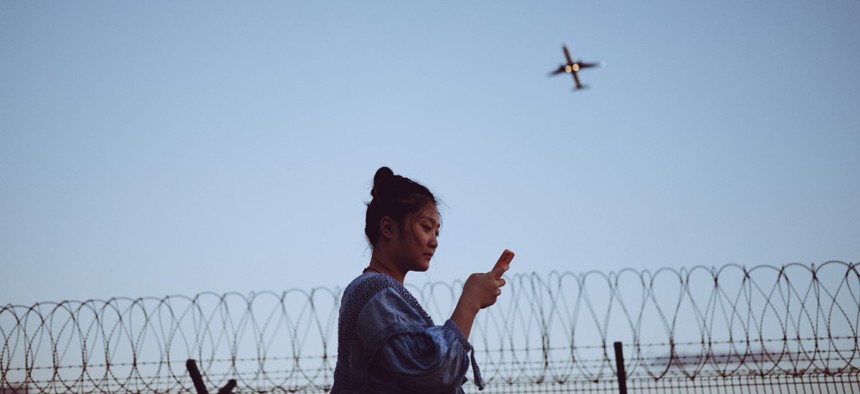Verizon, AT&T Reject Government Request for 5G Delay

Qi Yang/Getty Images
Leaders at Transportation and the FAA raised concerns about 5G C-band’s interference with air travel safety, which private sector CEOs dismiss.
Editor's Note: After this story was published, the telecommunications companies opted to delay the rollout briefly. Read the latest story here.
Major telecommunications companies Verizon and AT&T denied government agencies’ request to delay the pending 5G rollout despite concerns over the technology’s impact on airline safety and operations.
In a Dec. 31 letter from the Transportation Department and Federal Aviation Administration, Transportation Secretary Pete Buttigieg and FAA Administer Steve Dickson asked leadership from both companies to delay the 5G C-Band slated to take place on Wednesday Jan. 5.
The original rollout date was scheduled to take place on Dec. 5, but was postponed due to concerns voiced by the FAA. Buttigieg and Dickson cited similar concerns over the C-band spectrum’s potential to interfere with radio signals used by airports and pilots to determine where an aircraft is in relation to the ground. They warned that deploying a 5G C-band service too quickly could further disrupt the fragile aviation industry’s operations, and asked for an extension on the rollout.
“Failure to reach a solution by January 5 will force the U.S. aviation sector to take steps to protect the safety of the traveling public, particularly during periods of low visibility or inclement
weather,” the Transportation and FAA letter reads. “These steps will result in widespread and unacceptable disruption as airplanes divert to other cities or flights are canceled, causing ripple effects throughout the U.S. air transportation system.”
In response, leadership at both Verizon and AT&T co wrote a letter, rejecting the agencies’ request for a delay.
Dated Jan. 2, AT&T CEO John Stankey and Verizon CEO Hans Vestberg explained that both companies have steadily allocated resources to the safe deployment of 5G C-band technology, and that they have consistently met and surpassed the operation restrictions set by the Federal Communications Commission to ensure airplanes can communicate and travel safely.
“We care deeply about the safety of our customers, employees and families, all of whom
fly domestically and internationally for business and pleasure,” both CEOs wrote. “Our two companies are deeply committed to public safety and national security, and fortunately, the question of whether 5G operations can safely coexist with aviation has long been settled.”
Stankey and Vestberg further took issue with Transportation and FAA’s request aimed at just AT&T and Verizon.
“Agreeing to your proposal would not only be an unprecedented and unwarranted circumvention of the due process and checks and balances carefully crafted in the structure of our democracy, but an irresponsible abdication of the operating control required to deploy world-class and globally competitive communications networks that are every bit as essential to our country’s economic vitality, public safety and national interests as the airline industry,” the second letter says.
Stankey and Vestberg concluded their response by confirming that their companies will abide by the FCC’s strict mitigation measures and will exclude the 5G C-band deployment around several designated zones around select airports, modeled after exclusion zones operating in France. These additional precautionary measures will be in effect until July 5.
“France provides a real-world example of an operating environment where 5G and aviation safety already co-exist,” the second letter says. “The laws of physics are the same in the United States and France.”
In a statement emailed to Nextgov, the FAA said that officials “are reviewing the latest letter from the wireless companies on how to mitigate interference from 5G C-band transmissions. U.S. aviation safety standards will guide our next actions.”
The FAA also noted that France used a lower gigahertz frequency than what is proposed in the U.S. 's 5G C-band plan, which carries less risk for radio signal interference.
Stankey and Vestberg reiterated that their companies are adhering to the FCC’s provisions and noted that the agency recommended that airline companies upgrade their equipment two years before C-band rollouts.
Transportation and the FCC have previously collaborated on carefully evaluating safety risks regarding C-band deployment and aircraft radio communications. Former Chairman Ajit Pai sent a letter in January 2020 to House Transportation and Committee Chair Rep. Peter Defazio, D-Ore., assuring that “[a]ny actions the Commission takes regarding [the 3.7 GHz] band will be carefully designed so that aircraft are able to use altimeters in a continuous and uninterrupted manner,” as quoted in a 2020 letter from the FAA.
Earlier reports from third party agencies like the Government Accountability Office recommend that agencies like the FCC and the National Telecommunications and Information Administration implement guidelines for studies on spectrum interference to achieve a stronger consensus on the threats 5G technology could pose to aircraft.
The U.S. has long struggled to deploy advanced 5G networks across the country, with a national strategy laid out by former President Donald Trump in 2020. Funding for expansive 5G broadband access was also a centerpiece in President Joe Biden’s hallmark infrastructure bill, building upon various legislation introduced over the years to develop an American infrastructure for 5G.






